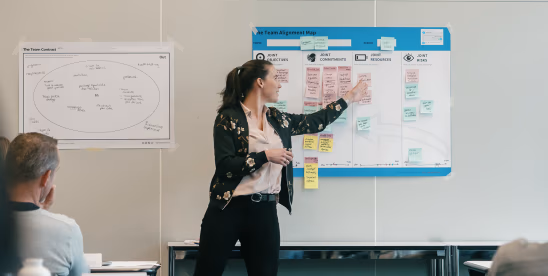While most business schools and continuing education programs teach management techniques, the fundamental notion of project leadership is often overlooked! And yet, the difference between a manager and a leader exists: while the former plays the role of orchestra conductor, and his power is exercised through his function, the latter will be followed by his collaborators thanks to this natural form of authority.
Discover our new Project Leadership training course!
By the way, what is project leadership?
Demanding but fair, the project manager is capable of leading, guiding, supporting and protecting his teams. From planning and design to analysis and closure, he or she has overall responsibility for the project.
A true orchestra conductor, his role is to achieve the expected results by managing three essential criteria: cost, scope and project delivery time.
Today's project managers need to develop their leadership skills. This "natural" charisma comes from the manager's qualities, skills and know-how. Empathetic, good listeners and open-minded, leaders have a high level of relational intelligence.
In this program, we will address these two dimensions: project management and leadership development.
Generally speaking, a leader is a good manager... but the opposite is not always true!
Focus : the modules of our Project leadership program
Human project management
As the company's essential "intangible assets", employees need to be supervised and listened to. In our training, we place the human element at the heart of project management.
The project leader must therefore understand the stakeholders involved, and manage and connect the various project teams to help them achieve a common goal.
The project leader's objective will therefore be to understand the stakeholders, and to manage and bring together the various project teams.
Inclusive leadership
A dynamic, collaborative approach, inclusive leadership takes into account the transformations brought about by globalization. In particular, it involves forging links between the company's different sectors and profiles. It also addresses the issue of cultural, religious and gender diversity, which can sometimes be an obstacle to collaboration.
Design thinking
Born in the 2000s, this tool is based on collective intelligence, i.e. a process of co-design and co-creativity. An essential stage in the design thinking method, the ideation phase is a group session bringing together different profiles (designers, developers, product/service users, etc.). The aim? To generate ideas, points of view and solutions to problems.
In the corporate world, it applies perfectly to project management: this modern management model is designed to improve project launch and deal with complex issues.
Agile leadership
Based on the SCRUM methodology, agile leadership is a particular management style. It is based on decentralized decision-making, encouraging employees to take responsibility for their own actions. This method also involves breaking down a project into several smaller ones. The aim?
- Speed up decision-making and time-to-market (the product/service is delivered more quickly).
- To be more responsive and agile to change (generally, between the start of the project and the time of delivery, the market and the environment have evolved).
Agile leadership also means speeding up decision-making, establishing a mindset focused on collaboration (rather than control and command), and adopting a more horizontal, closer interaction with the management team.
Project resilience
A tool of strategic design, project resilience refers to the ability to manage risk and "bounce back" after a shock or unforeseen event. The aim of our program? To teach you how to create a sustainable project, and thus go beyond deliverability.
The 4 benefits of our project management program
We're well aware that there are many different types of project management training. So why choose our Project Leadership course?
The reason is simple: most certifications (PMI, IPMA, Hermes) focus on methodology and tools. That's good, but in our opinion, not enough 😉
At Executive Education HEC Lausanne, our approach is more modern, more agile, more human-centered. We take a detailed look at the criteria of flexibility and iteration to make business projects last over time.
- Our program focuses on managing people and diversity: we've chosen to (re)put people at the heart of the project, because they're the key to success!
- We offer cross-disciplinary program, with complementary notions such as design thinking and strategic design. Indispensable for opening up new perspectives on project management!
- We teach an agile approach to project management, based on SCRUM methodology.
- We pay particular attention to project resilience. More than just designing and implementing a project, we teach you how to make it last over time. From ideation to sustainability, our Project Leadership training covers every stage of project management.
To ensure consistency in the approach of our programs, we have called on speakers with very different profiles and backgrounds. Each will have the opportunity to share their experience and expertise with you!





